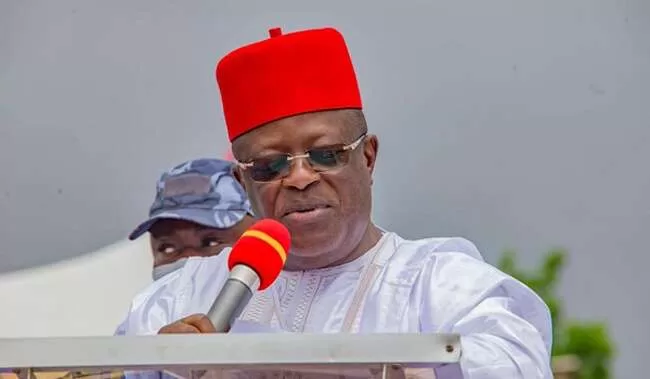The Minister of Works, Engr David Umahi, says the construction of Lagos-Calabar coastal highway project will gulp about N2.8 trillion.
Umahi disclosed this during a press conference and stakeholders’ meeting at Eko Hotels in Lagos on Thursday.
He was reacting to the claim made by the presidential candidate of the Peoples Democratic Party (PDP) in 2023 election, Alhaji Abubakar, that one kiolmetre of the road project gulps N8 billion.
The minister’s revelation, showed that the infrastructural project which is 700 kilometres will consume N4.39 billion per kilometre as against the projected amount by Atiku.
Umahi also debunked claims that the project did not follow the due procurement process.
He added that the project was awarded on a counter-funding basis and not on a Public-Private Partnership as claimed.
According to him, “There are seven questions the respectable former Vice President is asking. Of these seven questions, I have answered with 14 answers. On the cost of the project, a kilometre of the road will cost N4.39 billion. If this is applied to the 700 kilometres, we are talking of about N2.8 trillion.
“The procurement for this project is most prudent. With the standard of work that will be done on this coast road, ocean surge is conquered When building a coastal road, use of concrete is most appropriate than asphalt or any construction model.
“The major fact about this Lagos-Calabar coastal highway is that it will bring foreign investments to many states and the country as a whole”
Last week, Atiku criticised President Bola Tinubu’s decision of awarding the contract to Gilbert Chagoury’s Hitech without competitive bidding, daring the president to disclose the full cost of the Lagos-Calabar highway project.
He also wondered why the Tinubu administration released N1.06 trillion for the pilot phase, or six per cent of the project, which starts at Eko Atlantic and is expected to terminate at the Lekki Deep Sea Port.
In response to Atiku’s criticism, the minister said: “People are just building castles without knowledge and they don’t know figures, I will run the figures for you. We are going to compare the cross-section of the one the former vice president mentioned that was renegotiated for $11.1bn for 700 km.”
“So you have to now ask what was there to be constructed. And what was there to be constructed is the only available design from NDDC. They had designed the entire 700 km but we are not following exactly that pattern or right of way. We have a different modification. The original design had two carriageways on each side of the road with four lanes.
“And in the middle, they did not provide for the train track. It’s just going to be a water-collecting basin. But the coastal road we are constructing has a total of 10 lanes, you know, not only that it has a total of 10 lanes, it also has what we called shoulders.
“And the total shoulders can be put at about 23 metres. So when you put the total concrete pavement we are doing, it’s about 59 metres. When you put the total flexible pavement that he quoted it’s about 23 metres.” he said.
He continued, “And so when you run the figures, you now find out that under his calculation, it is giving you about over N19bn per kilometre. Now if you divide it by the 23 kilometres that they are doing, it is about 2.225 times a standard superhighway carriageway, which is N11.55 billion.
“Whereas what we are doing, if you divide it, you get N5.167bn, So when you now divide using our N1.067 trillion, you get about N4 billion per kilometre. If you go back to what he has quoted, you will get over N8 billion. So using concrete, which should be more expensive because of the kind of terrain we have, and using flexible pavement, which shouldn’t stand the coastal route, you will find out that our cost is N4bn instead of the N8 billion claimed by the former Vice President.”
On the when the project would be completed, Umahi confirmed that it would be completed within eight years, stating that concrete would be used for pavement on the four-lane carriageway,.
The minister assured those whose buildings would be demolished of prompt payments of compensation within 72 hours after verification. He also extended the demolition notice by more days after the expiration of one week notice earlier issued .
Many stakeholders which include traditional rulers, government officials and residents from various communities with their representatives were present at the meeting.











